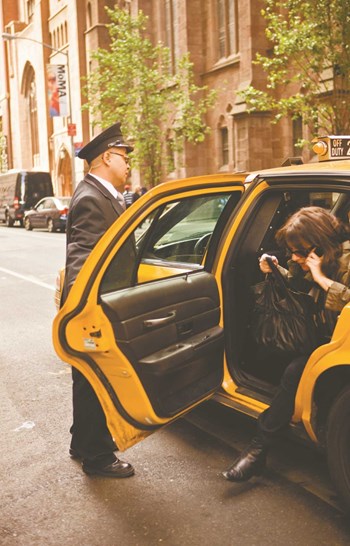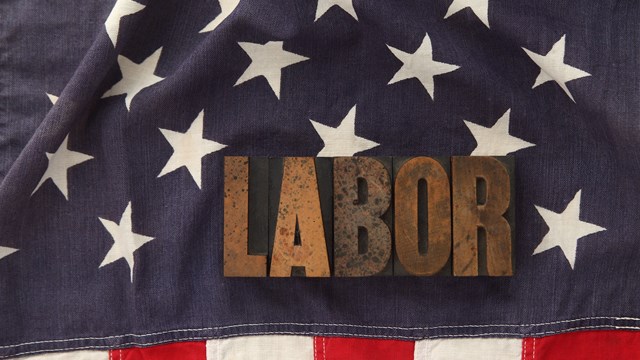
While a building’s facade might draw the eye initially, it’s usually the first employee a visitor encounters that forms a lasting impression. And for many condominiums in New York City, the resident doorman holds this coveted, all-important role. Good impressions are important—but what makes a good doorman or doorwoman?
Characteristics of a good doorperson are “honesty, dependability, courtesy, graciousness and the ability to communicate well,” according to Rosemary Paparo, director of management at Buchbiner & Warren. Consideration of residents' privacy and alertness are also traits held in high regard in the residential service industry, Paparo adds. “They need to be very, very discreet because the worst thing for a building is when you have a doorman who talks too much, both to anybody coming in off the street or tells other people's business to other residents. You have to really keep a level head on your shoulders because you never know who is going to walk in the door and what you have to deal with—you have to be alert.”
Career Profile
Having a good doorman or doorwoman is a paramount concern of any property manager or board, and the residential services market is saturated with candidates. According to the Local 32BJ Service Employees International Union (SEIU) based in New York City, the five boroughs employ almost 13,000 door people. This begs the question: How do property managers go about hiring the best doormen and doorwomen? There are several routes resident managers might take when searching for a new doorperson.
While some prefer to hire through in-house resumes like Paparo, most New York City-based managers turn to the SEIU to find skilled and reliable doormen and doorwomen, according to Angelo Petitto, a SEIU 32BJ field representative for the residential division of the Upper East Side. “Most of the time if there is an opening position, the resident managers or the managing agent would contact a specific field rep in their designated area because what they want is a qualified, experienced doorman and they will call us—they would like to utilize that service rather than hire from the outside because they know they’re getting an experienced, qualified doorman.”
SEIU provides its members a selection of courses, such as computer technology and medical training classes, to fully prepare door people for situations that might arise during the course of a day. This training sets SEIU members apart from non-unionized doorpersons and offers peace of mind to residential managers, Petitto says.
“We specialize in the property service industry—that is what our union is comprised of. Employers know we have the skills and the training to give the residents in their building the quality they are paying for. The advantage is [unionized doormen] are more qualified in their training and there are more opportunities for them to be better equipped in doing their job to the efficiency of the building.”
Meet and Greet
Responsibilities of doormen vary by building—and by time of day—but there are commonalities to the profession. According to Scott Cohen, who has been a doorman at a Park Avenue luxury building in the Upper East Side for eight years, the average morning and afternoon shift of a New York City-based doorman entails greeting residents with a smile, screening all guests, helping with the receipt of deliveries and assisting residents with their transportation, whether that will be hailing cabs for them or ordering car services.
While most residents recognize the hard work put forth, others can overlook the long hours logged in and the difficulty of a doorperson’s position. Because most attended buildings offer 24/7 service, doormen and doorwomen must be resourceful and flexible in their position. Nothing tests the limits of a doorperson's ability to be a jack-of-all-trades like a night shift, says Cohen. “My job as the overnight guy is to get the building cleaned and ready for the next morning. I mop the lobby, buff the floors and clean the glass and brass,” Cohen says. “You can get a leak in the middle of the night, you have to know what to do or who to call. The elevator could break. It's very important for the super to have a good night guy because the night guys have to make a lot of decisions.”
Cleaning tasks and general building maintenance aside, security becomes a doorperson's main priority when working the night shift, regardless the location of their building. “Whether it's Park Avenue or not, all neighborhoods change from midnight through the morning,” Cohen says. Added security awareness includes watching video surveillance cameras and building entrances diligently, as well as keeping solicitors at bay. The presence of a well-trained, quality door staff, especially at night, increases the security of a building and is a crime deterrent, Cohen adds. “Anybody who lives in New York City knows if they are going to a doorman building, they are not going through that front door without being screened. The staff is the security.”
Time of day isn’t the only variable that changes the duties of doorpersons. According to Cohen, the duties of the doorman and doorwoman must change with the same fluidity and ease as outside forces—in this case, the weather. While temperatures become unbearably hot during New York’s summer months, Cohen says nothing puts a strain on a door person’s everyday tasks such as opening building doors for residents and hailing cabs quite like icy winter days and nights. “During rush hour, sometimes it takes a long time to get a cab. You're freezing out there.”
Opening Doors and Opportunities
For those who haven't lived or spent much time in a building with a doorperson, the role can be confusing. There are more kinds of amenities provided by buildings than ever, which can include concierge service or porters. A building concierge has become more common in newer condominiums that attract certain residents. “A lot of people in the finance industry, and people that are convenience-oriented, is who we show these buildings that have concierge services. It's like having a personal assistant,” says Tara King-Brown, vice president of and associate broker at Douglas Elliman. “It's a huge allure for people particularly that are international. They don't know New York City, they're not interested in spending an hour researching what restaurant to go to, so they just call and say, 'Hey, I need something nice in the Meatpacking District,' and these guys will set them up with a reservation at a place they normally wouldn't be able to get into,” says King-Brown.
But, buildings with doorpeople tend to comprise a whole other demographic. “There's a huge population of people, especially in older prewar buildings, that still prefer a more traditional service,” says Dan Wollman, CEO of the real estate management firm Gumley Haft. “People who live in older co-ops have lived in New York a long time, and they know where they want to go and how to get there,” says Paparo.
Even though the doorman is a somewhat traditional service, new technologies have changed the way some doormen do their job. Particularly for buildings with more tech-savvy residents, some co-ops have adopted mobile phone services that all doormen to offer more services. “Some properties have added to their services by using mobile technologies. “If your dry-cleaning arrives, or you get a package, the building will send you an alert or an email to your phone to let you know that you can come pick it up,” says Wollman. Doormen will often be the ones keeping track of such alerts.
While the position of a doorperson requires one to wear several hats—greeter, security guard, tech-savvy concierge and sometimes even an interim plumber—no aspect of a doorman or doorwomen’s job is more important than genuinely caring about his or her building’s residents, says Cohen.
“No shareholder in an apartment building wants to see a grouchy doorman at the front door, especially in the morning or when they come home from work,” Cohen says. “All the people who live in Manhattan pay a lot of money to live there and they want to see a friendly face at the door—I love being at the front door. I just love being there for people. They appreciate it.”
W.B. King is a freelance writer and a frequent contributor to The Cooperator. Editorial Assistants Tom Lisi and Enjolie Esteve contributed to this article.






Leave a Comment